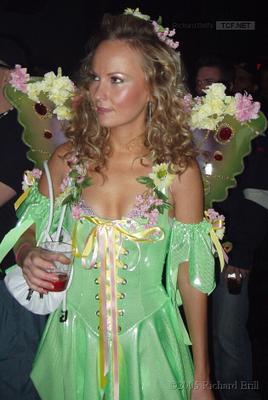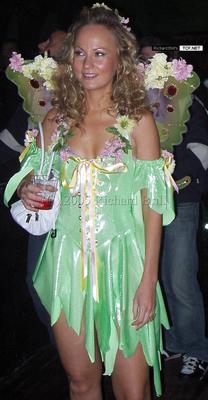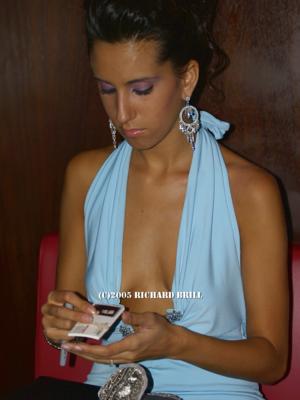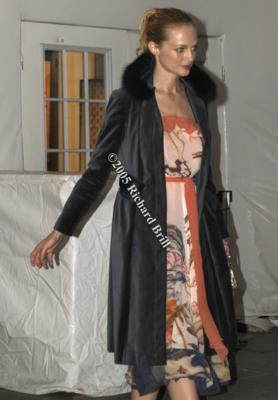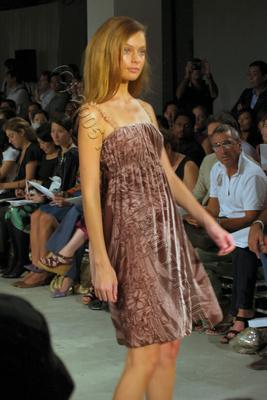Sunday, October 30, 2005
HIFF -- NOT JUST THE HAMPTONS
A quick trip to Google reveals that the Hampton's International Film Festival is not unique in the acronym HIFF. Here's some more:
Hawaii International Film Festival
The Haifa International Film Festival
Hertfordshire International Film Festival
Rakkautta & Anarkiaa - 18th Helsinki International Film Festival
The Harlem International Film Festival,
Thursday, October 27, 2005
HIFF WRAPUP + SOME PICTURES
All in all, the The Hampton's International Film Festival (HIFF) was quite successful. The weather was quite good almost all the time (except Saturday). There were large crowds. The movies were diverse and interesting. Many film makers and actors came to the parties, screenings, and other events, making for lots of networking.
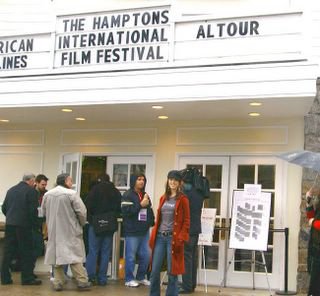
Johanna Watts, leading actress from IN MEMORIAM,
in front of the main festival theater on a rainy Saturday.

Because of the huge number of films, many shown at the same time, it was possible only to sample the offerings. Of those I saw, my favorite film was The Warrior Class, which is previewed below. My least favorite was The Bee Season, which is also previewed below.
I saw a number of other interesting films:
Kardia is about a woman investigating the heart operation she got as a child. It was honored by the Alfred P. Sloan Foundation, receiving the award for a feature length film that explores themes of science and technology. The Sloan Foundation also sponsored a panel discussion of the film, moderated by Bob Balaban.
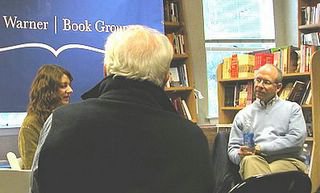
Bob Balaban and Su Rynard, the writer-director of KARDIA,
at a discussion sponsored by the Alfred P. Sloan Foundation

Ballets Russes is a collection of archival films -- including choreography by Fokine and Massine -- of two dance companies that brought new ballets to America, together with the tale of the rise and fall of those companies as told by the principal dancers. The film tells a good story. My only regret (or hope) is that they gathered many more films of dances than were used in the film. It would be very interesting to have access to much more of that footage, perhaps even with more commentary on the dances themselves, rather than on the competition between the two companies. On the DVD or the web, perhaps? I was struck by how much more I liked these old dances than the ballets I have seen recently. An offhand remark in the film suggests that it may be the influence of Balanchine that turned ballet in a direction that I find much less interesting.
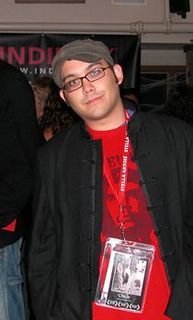
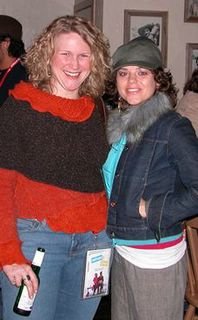
LEFT -- Josh Hyde, prize-winning student film maker of CHICLE (L)


Among the people at the festival were Erica Meerhsen, who gives an impressive performance in The Warrior Class, Johanna Watts, a seriously attractive (that is, very pretty and friendly) actress who stars in In Memoriam, and several student film makers, all prize winners, whose films were very impressive not just for the results, but also for the amazing effort that went into making them. Many of the people involved in short films were also there, including the producer, director, and a cute actress, Mindy Raymond, from Menage a Trois, a film with a cute premise shown in the program of women's short films. Liza Minelli, Alec Baldwin, Kyra Sedgwick, and Kevin Bacon were among the more famous actors in attendance. Asked by a member of the audience whether he finds acting in independent films to be different from working in commercial films, Kevin replied simply, "Yes. In the commercial films I get paid."
Wednesday, October 26, 2005
HUMAN TRAFFICKING ON LIFETIME
The miniseries Human Trafficking on Lifetime was just a little disappointing.
The acting, by Mira Sorvino was fine, and Donald Sutherland played a serviceable, though familiar, version of his (not so) gruff cop whose heart is really in the right place. Several of the actresses playing victims were made to look so similar I was never completely sure which was which. The most interesting acting is by young Sarah-Jeanne Labrosse, who plays a 12 year old American girl kidnapped in the Philippines. However, she plays the least believable character, a saintly child who ministers to all the other enslaved children.
The writing was just uninspired, and the film kept pulling its punches. This is a story about sexual slavery, but we could learn as much from any cop show and a one sentence description of the problem:
Children are kidnapped and sold; pretty girls are kidnapped and sold; or duped into essentially kidnapping themselves and then sold; the people who run the brothels are vicious.
The one sentence description of the solution is more dubious:
A dedicated employee (Mira) will push her bureaucratic, do-nothing, but ultimately humanitarian boss (Sutherland) to allow her to make the life-threatening, nearly super-human effort (including going undercover) necessary to break up this huge, multinational, sexual slavery enterprise, more or less all by herself.
None of the important confrontations in the story are really allowed to be fully dramatized. Sexual situations are suggested, but not shown. Dramatic situations are set up, but then the scene stops, and the drama is not allowed to play out. The only real emotional moment, significantly, comes when Mira Sorvino argues with her boyfriend about whether the picture of the bad-guy really looks really evil.
Of course, this is Lifetime TV, and for some the merest suggestion of the horrors of sexual slavery is barely watchable. For others, it's just right: in fact, there are reports this was the highest watched movie this year on ad-supported basic cable. Judging by the comments on the Lifetime site, this program does make people, who would not otherwise know about it, aware of a serious problem that does exist, and has been the subject of a number of stories in the New York Times, although the exact number of victims in the US is in some doubt.
I can imagine a Lifetime Miniseries about a producer of Miniseries on Lifetime who writes and produces Miniseries about very serious problems, to which he/she has a deep emotional response, but to "protect" his/her audience he/she just keeps suppressing his/her real feelings and serves up a bland, safe version. (Note: It is not dramatically correct, or powerful, to do that, even if it may well be politically and commercially correct.)
HIFF: THE WARRIOR CLASS & ALAN HRUSKA
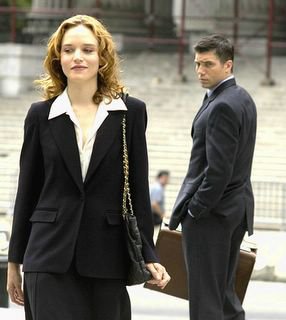
Anson Mount and Erica Leerhsen outside the courthouse in The Warrior Class

The best of the films I saw at HIFF (The Hampton's International Film Festival) was The Warrior Class (TWC), written and directed by Alan Hruska.
TWC, Hruska's second feature, is a legal drama, based largely on his experiences in a long and successful legal career and, particularly, on one very important case at the absolute beginning of his practice.
Three factors make this movie entertaining, especially interesting, and even important.
First, it contains a wild mix of elements that includes a very strange love affair, an educated, sophisticated, polite and vicious gangster, wiretapping, murder and drugs.
Second, it treats each of these factors -- and the trial itself -- very differently from the way we usually see them in movies, and weaves these disparate elements coherently into the story, yet with quite a different structure than we've seen in other films. Hruska deliberately created a depiction of the trial scenes and the addiction which is unfamiliar, but based on reality. He calls it, "An antidote to what you usually see.")
When I watched the film, at first I was confused: it did not look like the trials and the addiction I was used to seeing in the movies, but he sold it; and I bought it. I believe it.
Finally, the performance by Erica Leerhsen, swerving dangerously back and forth from beautiful and caring to scarily dependent on heroin, looking nothing like the addicts we have seen before, is ingenious and powerful.
Hruska was an English major at Yale, interested in writing. But he took a sudden plunge into the Law School there, and ended up at Cravath, Swaine & Moore LLP, where he is in semi-retirement now. While at Cravath, he published a novel, founded a publishing company, the Soho Press, and saw a lot of movies. (He says, "Movies have everything. They combine everything. It's the most intense art form.")
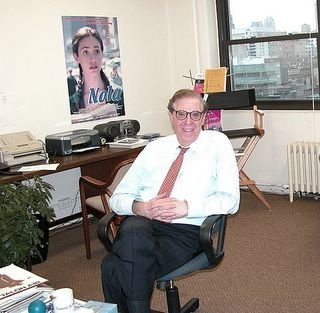
Alan Hruska - director of The Warrior Class - in his office

His first film, Nola, got some mixed reviews, some passionate fans, was part of the Tribeca Film Festival a few years ago, and can sometimes be seen on Lifetime, but is not yet out on DVD. Mary McDonnell appears in the movie, and the title character is played by Emmy Rossum who, at 19, is one of the rising young stars of the movies, having appeared in The Phantom of the Opera, The Day After Tomorrow, and Mystic River.
Hruska is currently directing a new production of Samuel Beckett's Waiting For Godot. One of the most important plays of the last century, and a notoriously difficult play to present successfully, but absolutely mesmerizing when the production works, this is Hruska's first experience directing a production for the stage. The opportunity came to him from a friend, Sam Coppola, who appeared in both his films, and is the further development of a project that was started by the actors themselves at the Actor's Studio. This production is scheduled to begin previews on November 8, 2005 at The Theatre at St. Clement's.
Having completed a successful -- and presumably abundantly lucrative -- career in law and publishing, Hruska's primary focus now is on creation. His freedom from the constraints, the conventions, the "notes," the traditions, and the pressures of commercial, studio directed movies, could allow him to enrich the art of cinema as he continues to write and direct. The Warrior Class is a genuine contribution.
Tuesday, October 25, 2005
BAD HABITS
Each month Quick Flick World invites film makers to create and submit a 4 minute film on a specific topic. This month's theme is Bad Habits.
Film makers in cities around the world (currently London, Barcelona, Berlin, Sao Paulo, Buenos Aires, Ciudad Del Mexico, and New York) then gather to discuss the films. The best films are shown on line and at parties in each city. It's international exposure and networking.
This month's party in NY will be on Tuesday, November 15th at Verlaine, on Rivington, between Essex and Orchard. Doors open at 7:00; screening at 8:00. (1/2 price drinks and a $5 recommended donation.)
In New York, the contact is: aaronrhyne@gmail.com.
HIFF: THE BEE SEASON
The Bee Season, adapted from a best selling novel by Myla Goldberg, was shown as the opening night film at HIFF (The Hampton's International Film Festival).
I hated this movie.
Here's the short, preview explanation. (Below, for those who have already read the book, or seen or never will see this movie, I'll tell you exactly why; but there'll be too much about the story to qualify as a preview for someone who wants to actually see the film.)
First of all, I should mention that the acting, by Juliette Binoche (currently at BAM's Next Wave, onstage in 4.48 Psychose) as the wife and, especially, Flora Cross as the daughter, was very fine, and I did love the film -- it had a brilliant, visually inventive beginning -- until Richard Gere opened his mouth and spoke. He seemed to be acting very hard, possibly even improvising, to convey his character's personality. The character was (apparently supposed to be) an obsessive Jewish mystic. (Gere is not believable in this film as obsessive, Jewish, or mystic.) Later, this character (was it in the book or changed to fit the star power of the movie?) becomes the most normal.
But what I really hated was that the story, as told in the movie, justifies lying and failure as being the right way to deal with familial dysfunction, and does not allow for the possibility of healthy, though intense, deep intellectual interests and philosophical investigations.
WARNING: WHAT FOLLOWS IS NOT A PREVIEW; DO NOT READ BEYOND THIS POINT IF YOU PLAN TO SEE THIS FILM.
Saul Naumann, the father of the family, is fascinated by words and their power. In his thesis, he studied the work of a mystic. He lectures to students on the power of Tikkun Olam, "the fixing of the world," or bringing shards together to make a whole. It is a very strange lecture. Why would he not write the phrase in Hebrew? What is the course? It does not seem, from what he says and how he says it, like a lecture in a course on comparative literature, comparative religion (or any other subject I can think of, for that matter).
In the movie, largely because of Saul's interest in Tikkun Olam and Kabbala mysticism, his wife goes completely crazy. I suspect that in the book there is more to her character, but in the film we see very little of her history or character development. When she blames her insanity on trying to measure up to his interest in Tikkun Olam, Saul simply says, "It's a metaphor." He seems to understand the role of mysticism in ordinary life and has it under control. No one else does, yet the film seems to try to blame everything on him, nevertheless.
At the end of the film, blaming herself, somehow, for her mother's insanity and believing her father too obsessed with her success, the young girl at the crucial moment, about to win the national spelling bee, deliberately gives the wrong answer and throws the contest.
By any normal standard, deliberately failing is reprehensible. If you are bribed to throw a contest which people bet on, that's a crime. Though the facts are slightly different (no bets, no bribes) this is actually the same thing. The girl deliberately throws the spelling bee because she thinks it would be bad to win. The film implies that this was a wonderfully wise and noble thing.
This celebration of lying and failing; this description of philosophical interest destroying everyone else in the family, in addition to being reprehensible on its face, also seems to me contrived. That is, this is not a brilliant description of a tragedy. (Tragedies are always about deeply flawed people.) This is a manipulated assault on the possibility of healthy intellectual passions and competitive success.
I have not read the book, and I do not know if I would have the same reaction to the book. Here are some quotations from the Random House web page for the book, presumably by the author:
"...the two days I spent there..." (at the 1997 National Spelling Bee)...
"...an alternate universe of anxiety and expectation ruled by one of the most arbitrary of systems: the English language..."
"...I became obsessed with spelling bees and how they can take on such great significance to the children and the parents involved in them..."
"...the spelling bee was pathologically important to a tangible percentage of contestants and parents..."
"...this ridiculous contest..."
Monday, October 24, 2005
Sunday, October 23, 2005
Saturday, October 22, 2005
Thursday, October 20, 2005
NEXT TRENDS FADS "RULES" & TECHNOLOGIES
Time magazine's current (Oct 24,2005) cover is "What's Next".
Business 2.0's (October, 2005) current cover is "How To Ride The Hottest New Trends."
There are lots of ideas inside both magazines, though they do seem as random as the selections I make for what gets posted here in QPORIT, where the R is (explicitly) for RANDOM. (My project: How To Predict The Future is designed in part to show how to do this prognosticating more systematically.)
Some of the more plausibly important items discussed in Time are:
- Apple's innovation machine;
- The search for new planets / planet-like objects in the solar system (one issue: What is a planet?) and an article about removing trans fats from foods (those last two not actually part of the What's Next section),
- A discussion of brain mapping, and
- Clint Eastwood's next twin films on the battle of Iwo Jima.
Business 2.0 discusses some technologies that are fighting competition for an important place in our economy, including
- HD radio -- competing with satellite radio,
- Wi-Max, one type of long range wireless competing with all the other types, and
- Micro fuel cells (fuel based power cells that are at least a few years away), competing with traditional batteries.
Here are two additional things I think may be very important:
First, the ability of electronics to make anything that passes through the system persistent, together with data mining techniques that allow that information to be searched and organized, puts a tremendous strain on privacy. Not just now, but aggravated during every passing minute.
Second, there are currently several very promising research projects underway on personal medicine. That means, for example, using genetic information to personalize drug treatments, especially for cancer.
(Needless to say, these two items are inter-related. The techniques of personalized medicine combine with the techniques for organizing persistent data to increase the threat to personal privacy and, conversely, personal medicine would not be useful, or even possible, without modern computing power, including massive, persistent medical and genetic data, and data mining.)
FIRST DISCOVERY AT HIFF - JERRY'S INK
I'm something of a magazine junkie. One of my favorite things to do at conferences and when visiting new places is to pick up the free literature and see what's locally interesting.
At the Hamptons for HIFF (HIFF = Hamptons International Film Festival), I picked up The Independent, a local paper, and looking through it noticed, in bold caps, in the middle of the page, "DIETRICH HATED SEX".
That caught my attention. I started right there and read down to the end. Then I went back to the beginning and read the whole column. It was funny, clever, interesting, and really great writing. (As for my own writing, by contrast, I just used the awful phrase, "really great writing".)
I finally checked the by-line.
It was Jerry's Ink, written by Jerry Della Femina, the advertising powerhouse who also owns Della Femina, an East Hampton's restaurant that rates a high score and capital letters (ie. very popular) in the Long Island Zagat.
As a magazine junkie, I mostly think that typography -- even newspaper typography -- makes an article more fun to read than unformatted Arial. Still, thanks to the web (The Internet is really amazing!) even if Jerry's Ink is not syndicated in any paper near me, I can still follow it on-line.
Tuesday, October 18, 2005
FALL 4 NY 2005: HIFF - HAMPTONS INTERNATIONAL FILM FESTIVAL
Three hours from NYC and just a few minutes down the road if you have a place in the Hamptons, the 13th Annual Hamptons International Film Festival begins tomorrow and runs through Sunday.
It is quite a major mini festival for independent films, with (by my count) something like 70 or more films (most of them some kind of premiere), and dozens of special events, talks, and parties. Taking place over just 5 days, it's clearly impossible for any one person to do everything. Lots of simultaneous events: pick and choose!
Among the highlights are:
The opening event, Bee Season, based on the novel, with Richard Gere and Juliette Binoche;
The closing event, The Weatherman, with Nicholas Cage, Michael Caine, and Hope Davis (who will be participating in festival events);
The winner of the Sloan Foundation award for a feature length film that explores themes of science and technology, Kardia;
Many short films including student films;
A restored version of Liza With A "Z", a 1972 filmed concert directed by Bob Fosse (one of my favorite choreographer/directors);
A bunch of interesting documentaries, including Modify, about piercing, tattoos, and other body modifications, Muskrat Lovely, about unfamiliar "folk" competitions ("Miss Outdoors" and muskrat skinning), and Ballets Russes, which contains restored footage from the famous revolutions in ballet in the early 1900s;
Many independent and international films, including a section on Films of Conflict and Resolution in Competition, juried by Debra Winger, David Dinerstein, and Ruth Diskin;
A collection of children's films;
The Warrior Class, directed by Alan Hruska, a lawyer turned film maker and theatrical director (Hruska is scheduled to direct Waiting For Godot next month);
Tristram Shandy, directed by Michael Winterbottom, whose last film was 9 Songs;
Special events about film making and acting;
and
The Matador, with Pierce Brosnan, Greg Kinnear, and Hope Davis, one of the first films from the new Weinstein Company.
And this is just a brief sampling.
Monday, October 17, 2005
FALL 4 NY 2005: THEATERMANIA
One of the best sources of information and tickets for theater in New York (including Broadway, Off Broadway, Off Off Broadway, concerts and special events), is TheaterMania (www.theatermania.com).
In addition to just looking them up for specific presentations, or browsing though their list of shows, they have discounts, a special program, the TM Insider, that gives daily information about new shows and significant discounts, and an even specialer program, TheaterMania's Gold Club, that provides access to exclusive events and sometimes provides almost complimentary (there's at least a $4.50 service charge) invitations.
Saturday, October 15, 2005
Ashanti
 Click on image to view larger
Click on image to view largerFor more Ashanti other great images
PLEASE VISIT TCF.NET
Tuesday, October 11, 2005
Monday, October 10, 2005
Friday, October 7, 2005
Thursday, October 6, 2005
Clones Fashion Show
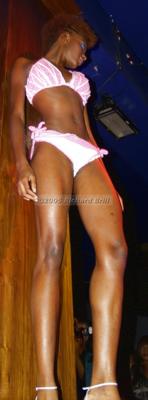 Click to make larger
Click to make largerhttp://www.tcf.net/clones-models.html
Tuesday, October 4, 2005
Sunday, October 2, 2005
A NAKED GIRL ON THE APPIAN WAY
The first -- amusing -- act sets up a prosperous couple living in a spacious home in the Hamptons with two of their three children on vacation together in Europe.
She is an author of cookbooks with a public presence and a demeanor not unlike (say, for example) Martha Stewart trying her best to be cheerful.
He is a rapacious businessman, always cheerful, with the charming forgetfulness of an absent minded professor, writing a book about how culture helps to bring out the best in business.
In the second act hilarious reality sets in as the children come home.
Reality here is a relative term. These people are nothing if not the ultimate professionals at creating the reality they want to believe they are living in.
It's a very interesting play, with a rich subtext. Jill Clayburgh and Richard Thomas, as the couple, find layers of complexity in their comic characters. The children and neighbors deliver many powerful jokes. The house is airy and beautiful, but it has some alien quality about it that gives it character.
The theater itself, by the way, is one of the most comfortable on Broadway / 42nd Street.
When I saw A Naked Girl On the Appian Way at an early preview, I had some reservations about some of the details, but after some days went by it was only the fun and the jokes and the subtext that stayed with me. That's the test of a fine play and great performances. It should be one of the hits of the season.
Subscribe to:
Comments (Atom)







